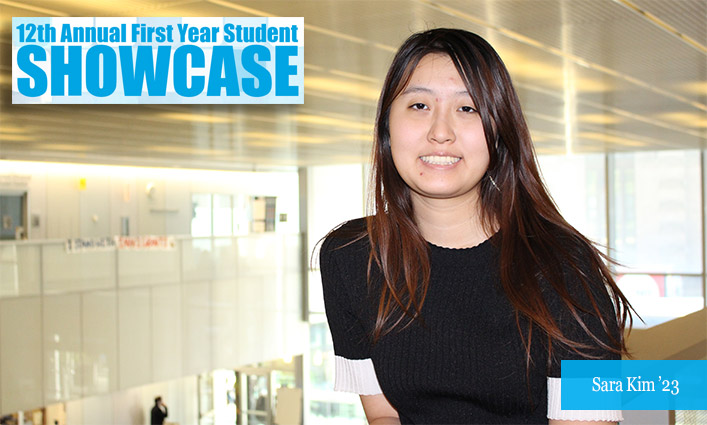
At John Jay College, research is a key element in our mission to educate for justice and create a fairer more equitable society. “The research that our faculty and students perform has lasting, positive impacts on our society,” says President Karol V. Mason. “Empirical data reveals inconsistencies, highlights disparities, and has the power to open minds and change policies.” At the 12th Annual First Year Student Showcase, coming up on December 11, our students will present their semester-long research projects that focus on current issues and provide recommendations on how to solve them. To gear up for this year’s Showcase, we chatted with some of our student presenters, to learn more about their experience conducting collaborative research and about their hopes for the future. Our first student presenter is Sunjo “Sara” Kim ’23, a Criminal Justice major from South Korea, who has been researching the effects of deportation on children.
Can you tell me a little bit about your project and how you and your group came up with the idea?
The title of our presentation is “The Unseen Face of Deportation.” We started with the broader topic of immigration, and then we narrowed it down to our current research question which is, “How does the deportation of undocumented parents affect children who are here legally?” My group members and I all agreed that we wanted to research something that is a current issue we are facing in this country. Deportation and immigration is a topic that is always on the news, so it was very easy to get everyone on the same page about researching it. But, what we found was that we didn’t want to focus on the actual process of deportation or the deportees, but on the children who are left behind.
Why does this topic speak to you?
These days, you turn on the news and you see images of children crying out for their parents, or you hear stories about families being ripped apart because of parents being deported. This makes me think about my own family, and how I would have felt as a young child being separated from them. I would have felt so lost and lonely, because your parents are the people who are supposed to be there protecting you. Imagine not having this and growing up alone in this country that has been so cruel to your parents, it’s not an easy task, and without that shoulder to lean on, it becomes harder. That’s why we were adamant about this topic, because rarely is there coverage on the emotional impact deportation has on the children who get left behind.
What were the most challenging aspects about conducting this research?
The most challenging aspect was working in a group. My group started out as five members but then one of the group members left, so we had to take on more responsibilities. Having to pick up the slack was a bit difficult. There’s also the fact that you have four different people with different ideas and schedules, so getting people together wasn’t easy. Then you had the differing opinions about the ways in which we should conduct the research. We tried our best to manage our time, by coming together during community hour, texting, or sharing our findings with each other, in the end, everything worked out well.
You worked with a professor on this research project. What was this experience like?
When I first found out about the showcase, I thought I would be completely lost and not know what to do. As a freshman, I’ve never done anything like this before and didn’t even know how to begin approaching this project. But Professor Merrit Corrigan was there to help us every step of the way. She helped us narrow down our topic and get to the research question we have now. She also helped us decide on conducting field observations and interviews rather than just searching for academic peer-reviewed journals. Having her there really made this process a lot easier.
As a College focused on justice issues, how does your research illustrate the concept of justice?
Immigration and the problems that we have with immigration is a big topic of discussion right now in America. Everywhere you turn there’s a new deportation case and everyone has a different opinion on it. This is a problem that needs to be solved. Separating children from their parents goes against their basic human rights. And let’s be honest, this generation of children is the future of America. If you take their parents away—the people who are supposed to guide and protect them—will America be the same? I don’t think it would, and we have to change that.
What has the First Year Showcase preparation process done for you as a scholar?
As a recent high school grad, you don’t really care about the outside world. You care more about yourself and what is going on directly around you, and it’s easy to be blind to what is actually happening out in the world. But this experience opened my eyes and showed me that there are many different perspectives, negative and positive, in this world. We have parents being taken away from their families, children being left alone and while this shouldn’t be happening, it does because of the different perspectives that are out there. As someone who hopes to work in the criminal justice field, this research experience has taught me to be more sympathetic and showed me that no matter what aspect of this field I end up in, I want to make sure that I am bringing communities together and not tearing them apart.
To learn more about this research project and others, make sure to come to the 12th Annual First Year Showcase on December 11.



